| Srl | Item |
| 1 |
ID:
088909


|
|
|
|
|
| Publication |
2009.
|
| Summary/Abstract |
Public diplomacy has become a critical component in grand strategy, particularly where the use of force by a state engages the attention of foreign audiences. 'Propaganda wars' now accompany, if not dominate, military moves on the battlefield, as rival states - and non-state actors - compete for the support of world public opinion. But whereas the military aspects of armed conflicts have been closely studied, their rhetorical side is only now beginning to attract the attention it deserves. This article seeks to advance the study of public diplomacy and propaganda wars by proposing a perspective that is based on the sociological and social-psychological theories of self-presentation and impression management. The assumption of a social and normative context renders meaningful the public accounts of conduct that states offer, while conceptualizing states as engaged in competitive self-presentation acknowledges the role of strategic considerations in shaping the message. The theoretical discussion develops the connection between rhetorical strategies and image-related predicaments in foreign public opinion. This is then applied to the analysis of a notable recent case - Israeli public diplomacy in the 2006 Lebanon war.
|
|
|
|
|
|
|
|
|
|
|
|
|
|
|
|
| 2 |
ID:
048888
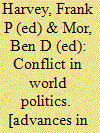

|
|
|
|
|
| Publication |
London, Macmillan Press Ltd., 1998.
|
| Description |
xvii, 366p.
|
| Series |
Advances in Political Science
|
| Standard Number |
0312176686
|
|
|
|
|
|
|
|
|
|
|
|
Copies: C:1/I:0,R:0,Q:0
Circulation
| Accession# | Call# | Current Location | Status | Policy | Location |
| 039905 | 327.1/HAR 039905 | Main | On Shelf | General | |
|
|
|
|
| 3 |
ID:
117044
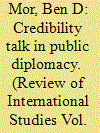

|
|
|
|
|
| Publication |
2012.
|
| Summary/Abstract |
Politics has become a contest of competitive credibility', argued Nye in Soft Power. Indeed, being perceived as honest and reliable is a necessary condition for obtaining and holding the attention of target audiences, as well as for effective persuasion, which is the objective of strategic communication. This task has become all the more difficult with the explosion of information sources and the discreditation efforts of opponents, but it is an essential element in the conduct of public diplomacy. How, then, do states and other international actors go about establishing their credibility while undermining that of opponents? This article employs rhetorical theory, impression management theory, and account theory to situate contests of credibility within the broader context of the accountability of social conduct. The theoretical part discusses the rhetorical strategies that actors use to credit their accounts and discredit those of their rivals. The empirical part addresses the debate between Israel and human rights groups over the Qana bombing incident of July 2006. The analysis of the blame imposition strategies used by Amnesty International and Human Rights Watch and the accounts offered by Israel, indicates the range and variability of credibility talk and the rules for crediting accounts that underlie it.
|
|
|
|
|
|
|
|
|
|
|
|
|
|
|
|
| 4 |
ID:
145097
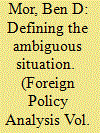

|
|
|
|
|
| Summary/Abstract |
In studies of war and terrorism, an exclusive focus on action misses an important and logically prior stage of constitutive thinking and discursive contestation. Particularly in ambiguous contexts, which states often face when waging conflict against nonstate actors such as terrorist organizations, how the situation is defined is a key to understanding state decision making and action. This paper employs symbolic interactionist theory to analyze the process of defining situations under ambiguity. It argues that how different domestic actors develop preferences for definitions depends on (i) the kind of situational parameters that they monitor as part of their group perspective, (ii) the availability of historical analogies, and (iii) (role)-identity and self-esteem needs, namely the legitimation of actors' claimed identity through an effective role performance. These ideas are examined in a case study of Israeli understanding of and response to Hizbollah's attack of July 12, 2006, which developed into the 2006 Lebanon War (known in Israel as the Second Lebanon War).
|
|
|
|
|
|
|
|
|
|
|
|
|
|
|
|
| 5 |
ID:
012090
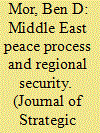

|
|
|
|
|
| Publication |
march 1997.
|
| Description |
172-202
|
|
|
|
|
|
|
|
|
|
|
|
|
|
|
|
| 6 |
ID:
069114
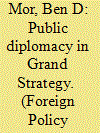

|
|
|
| 7 |
ID:
054250
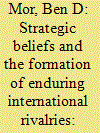

|
|
|